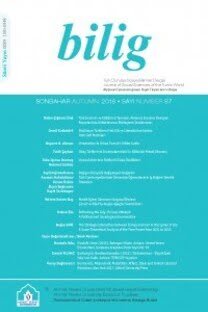Cengiz Aytmatov'un Gün Olur Asra Bedel'inde Kimlik Oluşturma Süreçleri
Identity Formation in Cengiz Aytmatov's A Day Lasts Longer More Than a Hunderd Years
___
Ahıska, Meltem (1996). "Kimlik Kavramı Üstüne Fragmanlar". Defter 9(27): 9-36.Aktaş, Şerif (1999). Milli Romantik Duyuş Tarzı ve Cengiz Aytmatov'un Gün Olur Asra Bedel Romanı (yapı- Kültür-Anlatma Tarzı). Doğumunun 70. Yıl dönümünde Cengiz Aytmatov. Ankara: Atatürk Kültür Merkezi Başkan- lığı Yay.
Alphen, E. V. (1991). "The Other Within". Amsteredam Studies on Cultural Iden- tity. Ed. J. L. Raymond Corbey. Amsterdam, Atlanta: Rodopi. 1-15.
Altbach, Philip G. (1971). "Education and Neocolonialism". The Post-Colonial Studies Reader. London & New York: Routledge. 381-384,
Anderson, Benedict (2004). Hayali Cemaatler: Milliyetçiliğin Kökenleri ve Yayıl- ması. Çev. İ. Savaşır. İstanbul: Metis Yay.
Ashcroft, Bill (1989). The Empire Writes Back: Theory and Practice in Post-colonial Literatures. New York, London: Routledge.
_____, (2001). Post-Colonial Transformation. London and New York: Routledge.
_____, (2002). Post-Colonial Studies: The Key Concepts. London & New York: Routledge.
_____, (2007). The Post-Colonial Studies Reader. London & New York: Routledge.
Assmann, Jan (1997). Kültürel Bellek. Çev. A. Tekin. İstanbul: Ayrıntı Yay.
Aytmatov, Cengiz (2009). Gün Olur Asra Bedel. İstanbul: Ötüken Yay.
Bhabha, H. Khomi (1994). The Location of Culture. London and New York: Routledge.
Dirlik, Arif (2010). Postkolonyal Aura: Küresel Kapitalizm Çağında Üçüncü Dünya Eleştirisi. Çev. G. Doğduaslan, İstanbul: Boğaziçi Üniversitesi Yay.
Eagleton, Terry (2003). Edebiyat Kuramı. Çev. T. Birkan. İstanbul: Ayrıntı Yay.
Ersoy, Ruhi (2009). Sözlü Kültür Tarih İlişkisi: Baraklar Örneği. Ankara: Akçağ Yay.
Fanon, Frantz (1967). Toward The African Revolution. Harmondsworth: Pelican.
_____, (2008). Black Skin, White Masks. Çev. C. L. Markmann. London: Pluto Press.
Franger, Bert G. (2010). "Sovyet Milliyetçiliği: Orta Asya'nın Bağımsız Cumhuri- yetlerine Kalan İdeolojik Miras". Orta Asya ve İslam Dünyasında Kimlik Poli- tikaları. Ed. E. J. Willem van Schendel. İstanbul: İletişim Yay. 23-49.
Harvey, David (1990). The Condition of Postmodernity. Oxfort: Blackwell.
Huddart, David (2006). Homi K. Bhabha. London and New York: Routledge.
Kachru, Braj B. (2006). "The Alchemy of English: The Spread of Functions and Models of Non-native Englishes Champaign". The Post-Colonial Reader. Ed. Bill Ashcroft. London and New York: Routledge.
Khalid, Adeeb (2000). "Russian History and the Debate over Orientalism". Kriti- ka 1(4): 691-699.
Kolcu, Ali İhsan (2008). Bozkırdaki Bilge: Cengiz Aytmatov. Erzurum: Salkımsöğüt.
Knight, Nathaniel (2000). "Grigor'ev in Orenburg, 1851-1862: Russian Orien- talizm in the Service of Empire?". Slavic Review 59(1): 74-101.
Korkmaz, Ramazan (2004). Ötekileşme Sorunu ve Dönüş İzlekleri. Ankara: Türk- soy Yay.
Kundera, Milan. (2005). Roman Sanatı. Çev. A. Bora. İstanbul: Can Yay.
Lacan, Jacques (2006). Ecrits. Çev. B. Fink. New York-London: W. W. Norton & Company.
Lazzereni, Edward J. (1997). Local Accommodation and Resistance to Colonial- ism in Nineteenth-Century Crimea. Russia's Orient: Imperial Borderlands and Peoples, 1700-1917. Ed. E. J. Daniel R. Brower. Bloomington: Indi- ana University Press. 169-188.
Said, Edward W. (1996). Culture and Imperialism. New York: Vintage Books.
Thompson, Ewa M. (2000). Imperial Knowledge. Westport, London: Greenwood Press.
Young, Robert J. (1995). Colonial Desire. London & New York: Routledge.
_____, (2001). Postcolonialism: An Historical Introduction. Oxford: Blackwell.
- ISSN: 1301-0549
- Yayın Aralığı: 4
- Başlangıç: 1996
- Yayıncı: Ahmet Yesevi Üniversitesi Mütevelli Heyet Başkanlığı
XIX. Yüzyılın İlk Yarısında Istabl-ı Âmirenin Gelir ve Giderleri ile İlgili Bir Değerlendirme
Bilgisayar Bir Metni Vurgulu Okuyabilir mi?
İ. Baran USLU, NURETTİN DEMİR, H. Gökhan İLK, A. Egemen YILMAZ
Cengiz Aytmatov'un Gün Olur Asra Bedel'inde Kimlik Oluşturma Süreçleri
The Ottoman Travellers' Perceptions of the Far East in the Early Twentieth Century
Yükselen Tehdit Algısı Karşısında Çin'in Yumuşak Güç Siyaseti: Politikalar ve Sınırlılıkları
M. Turgut DEMİRTEPE, Hasan Selim ÖZERTEM
Kıbrıs Ağzıyla İlgili İki Araştırma
İkinci/Yabancı Dil Öğretiminde Sadeleştirilmiş Metin Sorunları Üzerine
XIX. Yüzyıl Ortalarında Bir Osmanlı Kasabasındaki Şahıs Adı Profili
